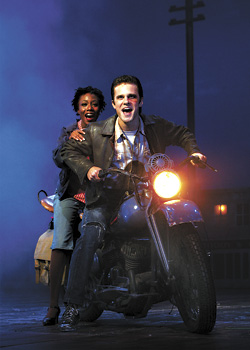To understand Andrew Lloyd Webber’s Whistle Down the Wind, you have to know what the phrase means. “When a ship is lost at sea and a fog comes down,” its producer/director, Bill Kenwright, has explained, “you must whistle downwind as opposed to upwind, so that the sound will be carried and spread to others.”
When Lloyd Webber first wrote the piece in the mid-’90s, he was lost at sea in a Stygian fog. The most recent hit of his career, Sunset Boulevard, had lost zillions. To paraphrase Judas in the composer’s Jesus Christ Superstar, he didn’t know its messy death would be a record-breaker.
He’s always been an oeuvre Hoover, sucking up everything from Puccini to pop and transforming it into most original pastiche. But he was losing juice, and losing contact with his rapidly shrinking audience. It was as though the shifting wind made him mute to the crowds—tough on a guy who fancies himself a Beatles-beater.
So he went to Louisiana to get inspiration for a ’50s-style rock movie musical adapting the 1961 British flick Whistle Down the Wind, wherein child star Hayley Mills finds a con on the lam and mistakes him for her Savior because when she asks who he is, he’s startled and yells, “Jesus Christ!” Kirsten Dunst screen-tested for the Mills part, and Johnny Depp, Anna Paquin, and Natalie Portman were buzzed to costar.
Lloyd Webber claims Hal Prince talked him into doing it onstage instead. Prince said Lloyd Webber phoned him. I’ll bet the film deal died—maybe Depp got too pricey after Pirates of the Caribbean. The stage show bombed in 1996 and never hit Broadway, though subsequent productions did OK.
The current touring production does OK, too. Career crisis inspired some of Lloyd Webber’s most poignant melodies, setting lyrics by Jim Steinman (author of Bonnie Tyler’s exhilaratingly Broadway-cheesy “Total Eclipse of the Heart”). ALW protégé Andrea Ross excels as Swallow (the Hayley Mills lead role), belting out words no doubt close to the fallen composer’s hurting heart: “Let your voices carry/Drown out all the rain/Light a patch of darkness/Treacherous and scary.” The first thing I did when I got home was to order Ross’ ALW-produced CD, Moon River. She’s a bright-eyed Sarah Brightman type, an overfrosted cupcake of a voice with a winsome sweet-16 innocence.
The problem is, Hayley Mills was a child in the original, so it (barely) made sense that she’d innocently believe a smelly convict was Jesus. A teenager who believes this is mentally impaired. The show’s entire story is literally unbelievably bad: The kids protect the con until the local Bull Connor–type cops get wind of him and try to arrange a decent Viking funeral. There’s an irrelevant subplot about the town biker rebel (unwild one Matt Skrincosky), his black girlfriend (Carole Denise Jones), and the racist townsfolk, and a still more desperately lost-in-the-fog subplot about snake-handling fundamentalists.
Stage magic does glint here and there. Ross and Eric Kunze, who plays the convict, have some chemistry. The rebels’ bike ride and Swallow’s near-death in a train tunnel are nicely flashy. They’re mired in a sorry mess of a story that repeatedly robs powerful songs of their proper impact. Scads of children (played by adorable locals) follow Swallow in worshipping the con/Christ, and they get a killer refrain, “when children rule the world—tonight!” It’s no wonder the first-act curtain tune, “No Matter What,” became the composer’s best-selling pop single ever.
Only the kids don’t rule. The story utterly fails to fulfill the song’s rousing musical promise. Kenwright counts eight “tingle moments” (high points) in the show. I counted more, from the exquisite harmonies of the Swallow/convict duet “Try Not to Be Afraid” to the nifty “A Kiss Is a Terrible Thing to Waste,” which Lloyd Webber says took him back “to my Jesus Christ Superstar roots.”
The elevating musical moments are stranded islands in a gloppy sea of plodding, pointless plot. The characters are exhausted clichés. The convict is a retread of Lloyd Webber’s Jesus Christ with no star power. Kunze played the lead in Superstar, and he’s got the histrionics down. He’s funny in the scene in which the kids demand a sermon, so he sings about Bible heroes and movie stars, whose names he knows better. But ultimately, Kunze can’t redeem this cipher of a role in a play with more subplots than resolutions.
“I was fed up with it all after Whistle Down the Wind,” Lloyd Webber said. “I was repeating myself and bored with musicals.” I didn’t feel that way after this production. I like the way he repeats good riffs, like pleasing outtakes from his prior hits. His star is as charming as her part is preposterous. I’m not sure the gusts from the 5th Avenue audience’s warm applause will carry this revival to Broadway at last. The book is too windy. But the tunes sure are whistleable.








